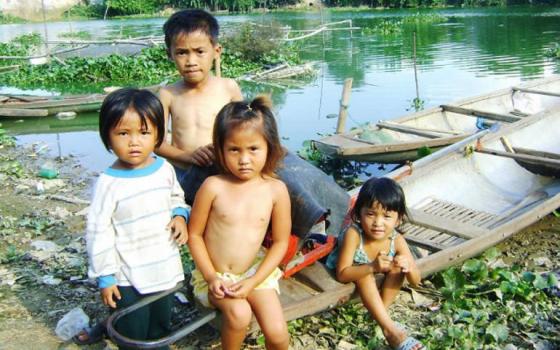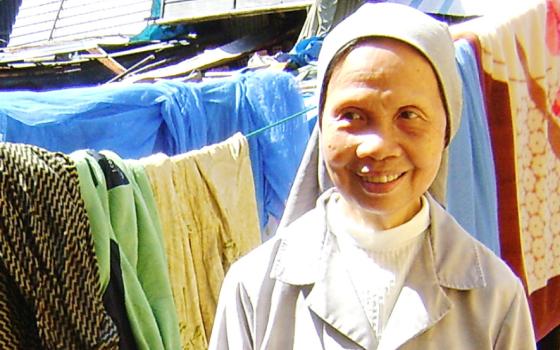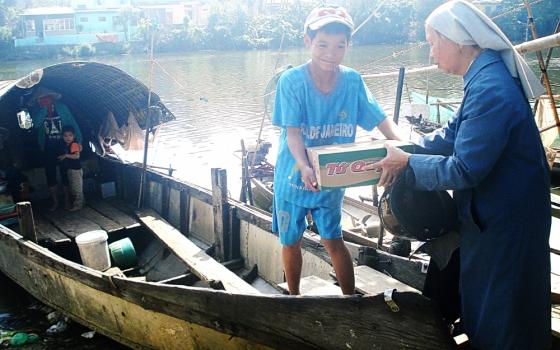For more than a dozen years, Sr. Ephrem Nguyen Thi Luu has been working with hundreds of families who have lived on small boats on rivers for generations in Hue City, central Vietnam. She is so commonly known among them that they call her “Me Luu” (Grandma Luu) instead of Sr. Luu.
Sr. Luu, who was born to a Buddhist family in nearby Da Nang City, joined the Saint Paul de Chartres Sisters in 1960 and has served the disadvantaged for 40 years.
Why do you engage yourself in working with ‘boat people?’
I am particularly concerned to help needy children from over 200 families who live on boats only 6 to 8 meters by 2 meters on rivers in the city. Some live in 4-square-meter huts made of leaves or pieces of plastic bags near the rivers or creeks.
They eke out a precarious existence by diving into rivers to catch fish and shellfish, while their children collect used items floating on rivers and in the algae, sell lottery tickets on streets and polish people’s shoes to support their families. But most of them often do not have enough food for their daily meals.
Their children lack winter clothes and grow up without personal papers needed to get medical treatment or go to public schools.
So our community tries to create opportunities for those needy people to live with human dignity and for their children to go to school or at least become literate and learn vocational skills to earn a good living.
How do you approach them?
We petition local authorities to allow us to open classes, and we invite teachers to teach teenagers basic education. We also provide stationery, health insurance and food for some other 200 children who are studying public schools.
For those who fail to keep pace with their classmates’ performance and have to drop out of school, we send them to state-run training centers for skills they can use to make a living in the future, such as tailoring, dress making, embroidery, repairing motorbikes and producing furniture.
On Sundays, some 50 children gather at our nunnery where they read comic strips, practice writing and learn how to dance. We have the boys’ hair cut and teach the girls how to cook. We also provide children life-coping skills, social behaviors and moral values, and offer them parties, lion dance shows and ‘lucky money’ and lottery tickets on Children’s Day, Christmas and Lunar New Year.
Have you seen their lives improved at all?
Many children go to school and training centers. Tens of people work at local factories, shops and restaurants. They behave in a friendly and courteous way towards others, dress properly, readily help one another, and rarely use foul language.
Do you see divine providence in your work?
Yes, it is very obvious that when beneficiaries increase, at the same time benefactors are also on the increase. In 2000, we worked with 10 children who collected used items and covered their school fees with a small sum of money a friend of mine donated. Now we work with 200 children and 400 adults. We also offer bicycles, tricycles, food, clothes, scholarships and medical expenses to Paco ethnic people.
What are the most satisfying and challenging?
Bringing love, courage and humanity to the marginalized and underprivileged. Seeing well-behaved children like angels playing with one another on the grass by river banks or walking to schools. People treat me like a member of their family and give me flowers on feasts.
Local authorities refuse to allow us to teach children directly as a way to prevent us from doing evangelization. We are also asked to get their permission before taking benefactors to visit ‘boat people’ and present lists of benefactors for their approval.
We are at high risk of being bitten by insects and snakes or injured by piles of rusty metal and other old used items piled on the river banks.
Have you ever regretted being a nun?
Never. I am very happy to be a Catholic nun. When I studied at a Saint Paul Sisters school, I dreamt Jesus appeared to me and I leaned my head on his chest. I also helped my parents and sister to convert to Catholicism.
I daily spend five hours praying with the Sacred Heart, reciting rosaries, attending Mass and reading spiritual books.
My most favorite Bible verse is, “In as much as you have done it onto one of the least of these my brethren, you have done in onto me.”
[Joachim Pham is a correspondent for NCR and GSR based in Vietnam.]
Editor’s notes - English/American measurement conversions for boat size is approximately 20 to 26 feet long by 6.5 feet wide. The huts described are about 13 feet square.
“Lucky money,” called “li xi” or "tien mung tuoi" depending on region, is essentially a small cash gift presented to people, usually children or elders, in small red envelopes on holidays in Vietnam to wish happiness and prosperity.



